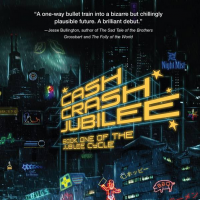Eli K. P. William's debut novel "Cash Crash Jubilee" is set in the Tokyo of the not-too-distant future, where each time you blink your eyes, a company deducts several hundred yen from your checking account. Corporations are now empowered to charge people after registering involuntary bodily functions (including farting) as intellectual properties — implanted BodyBank software makes sure nobody cheats.
Cash Crash Jubilee
by Eli K. P. William
392 pages.
Talos, Fiction.
This discomforting state of affairs would almost be funny if it weren't so intimidating. And as far as Amon Kenzaki — a hulking half-Persian, half-Japanese salaryman — is concerned, it certainly is. As a "liquidator" for the Global Action Transaction Authority, Kenzaki somewhat resembles the character portrayed by Harrison Ford in the 1982 science fiction classic "Blade Runner." Ford's job was to track down and destroy "replicants" (bioengineered humans); Kenzaki's is to capture bankrupt citizens and banish them permanently to "bankdeath camps" where they languish, forever disconnected from the action-transaction economy, in which every flat surface is used to beam commercial messages at the pedestrian's brain.
As the narrative develops, the dutiful and ambitious Kenzaki is ordered to liquidate Lawrence Barrow, the first non-ethnic Japanese to rule the country. (Barrow's father was a New Zealander.) As Kenzaki starts to harbor doubts over his assignment, his duplicitous supervisor and a group of powerful corporate oligarchs dispatch hired killers to eliminate him. The "Jubilee" saga will play out in two more installments.
Williams displays a creative flair in his treatment of a dystopian future Japan that's as entertaining as the works by American-Canadian science fiction giant William Gibson.

















With your current subscription plan you can comment on stories. However, before writing your first comment, please create a display name in the Profile section of your subscriber account page.